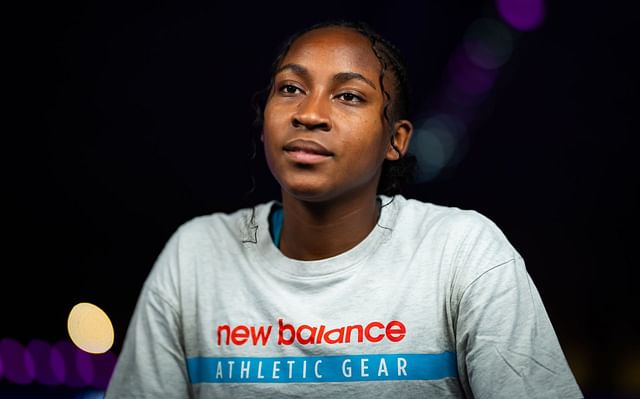
Coco Gauff, the 2023 US Open champion, recently shared her perspective on what she perceives as a “double standard” in Western media’s approach to covering issues in the Middle East compared to those in the West. Currently competing in the year-end WTA Finals held in Riyadh, Saudi Arabia, Gauff’s comments highlight a broader conversation about international media scrutiny and the complexities of playing in countries with controversial records on human rights. The 19-year-old, ranked World No. 3, voiced her thoughts on the matter in a recent interview with *The National* newspaper, bringing attention to both her personal experiences and a broader sense of Western media bias.
This year marks Saudi Arabia’s debut as the host for the WTA Finals, a tournament that will take place in the country through 2026. The move has sparked mixed reactions within the tennis community. Notably, legends Chris Evert and Martina Navratilova expressed concerns earlier in the year, openly questioning the appropriateness of Saudi Arabia as the event’s venue. In a letter to the WTA, Evert and Navratilova cited issues with the country’s human rights record, particularly in terms of women’s rights, and argued that awarding such a prestigious tournament to Saudi Arabia might reflect poorly on the WTA’s values.
Despite these concerns, the WTA proceeded with its agreement with Saudi Arabia, and Coco Gauff is among the prominent players competing for the year-end title in Riyadh. When asked by *The National* about her thoughts on Western media’s critical focus on Middle Eastern issues, Gauff responded with a candid statement on the double standards she perceives. She mentioned, “Being a person of colour, living especially where I live, it’s definitely a double standard. I feel it, and not even being from here, but just even as a tennis player in this space, I feel like people are over-critical of me because of that.” The young tennis star went on to acknowledge that as an American, she’s aware of the country’s own challenges, saying, “I do know, being from especially America, like we’re not saints either.”
Gauff’s statements echo a sentiment shared by some athletes and public figures who believe that while countries in the Middle East are often scrutinized for their policies and practices, similar problems in Western countries are overlooked. For Gauff, her decision to play in Saudi Arabia was informed by a desire to witness the country firsthand. She emphasized that she values criticism but believes it should be balanced with introspection, remarking, “I have no problem with criticism, but you have to be able to see your own faults. That’s why I think for me, when I made the decision to come here [to Saudi Arabia], I wanted to see how it is for myself.”
Gauff’s willingness to play in Saudi Arabia and her comments about Western media reflect a growing trend among athletes to engage in complex discussions on social and political issues. Earlier in 2024, Gauff also spoke out against the violence in Gaza, following the escalation of the Israel-Hamas conflict in October 2023. She addressed the tragic loss of life, especially among civilians, which has sparked global concern. According to reports, the ongoing violence has resulted in the deaths of over 43,000 Palestinians and 1,700 Israelis. Gauff expressed her disapproval of the violence, stating, “I don’t really support the mass violence going on to innocent people on both ends of the spectrum. And there’s one side that’s getting killed at more drastically faster rates than the other side.” This perspective generated a divided response from fans, with some appreciating her compassion and others challenging her views.
Despite the global issues she comments on, Gauff remains focused on her tennis career. Her recent performance at the WTA Finals reflects her determination and skill as she continues to rise in the rankings. In her opening match, Gauff defeated fellow American Jessica Pegula in a convincing win, showcasing her readiness for the competition. The next challenge awaiting her is former World No. 1 Iga Swiatek, a five-time Grand Slam champion, in what promises to be an intense and closely watched match.
Saudi Arabia’s involvement in the WTA Finals signals the country’s ambition to become a more prominent host for international sports events. Over the past few years, Saudi Arabia has hosted several high-profile sporting competitions, including boxing and Formula 1, as part of its Vision 2030 initiative aimed at diversifying its economy and promoting a more global image. However, the decision to host the WTA Finals in Saudi Arabia, a nation where women’s rights and civil liberties have historically been limited, remains contentious. Some critics see it as an attempt at “sportswashing,” using sports events to improve the country’s image internationally.
For athletes like Gauff, competing in Saudi Arabia raises questions about balancing the love for the game with the social and ethical implications of playing in countries with controversial records. By choosing to play in Riyadh, Gauff and her fellow competitors navigate a nuanced position that requires both sensitivity and a strong commitment to their sport. Gauff’s reflective stance on Western media’s double standards and her choice to experience Saudi Arabia personally reflect her thoughtful approach to the complexities of being an athlete on a global stage. As she competes in the WTA Finals, Gauff’s words and actions underscore the growing role of athletes as voices in societal conversations, especially when their decisions are intertwined with broader international issues.
In the meantime, Coco Gauff remains focused on the WTA Finals and her own journey toward cementing her place in tennis history. As she goes head-to-head with Swiatek and other top contenders, fans and critics alike will be watching closely, not only for her on-court performance but also for the ways she continues to use her platform to speak on issues beyond the game.
Leave a Reply